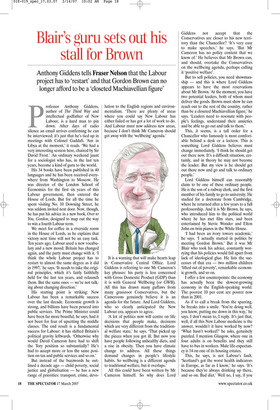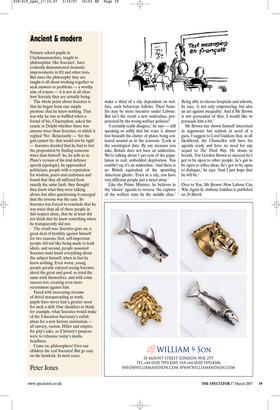Blair’s g uru sets out his
stall for Brown
Anthony Giddens tells Fraser Nelson that the Labour project has to ‘restart’ and that Gordon Brown can no longer afford to be a ‘closeted Machiavellian figure’ Professor Anthony Giddens, author of The Third Way and intellectual godfather of New Labour, is a hard man to pin down. After days of radio silence an email arrives confirming he can be interviewed; it’s just that he’s tied up in meetings with Colonel Gaddafi. ‘Am in Libya at the moment,’ it reads. ‘We had a very interesting session here, chaired by Sir David Frost.’ An ordinary weekend jaunt for a sociologist who has, in the last ten years, become a kind of guru to the world.
His 34 books have been published in 40 languages and he has been received everywhere from Washington to Moscow. He was director of the London School of Economics for the first six years of this Labour government, then entered the House of Lords. But for all the time he spent visiting No. 10 Downing Street, he was seldom invited next door. Now, though, he has put his advice in a new book, Over to You, Gordon, designed to map out the way to win a fourth Labour term.
We meet for coffee in a riverside room in the House of Lords, as he explains that victory next time will not be an easy task. Ten years ago, Labour used a new vocabulary and a new mood; Britain has changed again, and the party must change with it. ‘I think the whole Labour project has to restart to almost the same degree as it did in 1997,’ he says. ‘It needs to take the original principles, which it’s fairly faithfully held for the last ten years, and relaunch them. But the same ones — we’re not talking about changing direction.’ His starting point is striking: New Labour has been a remarkable success over the last decade. Economic growth is strong, and billions have been poured into public services. The Prime Minister could have been far more boastful, he says, had it not been for fear of upsetting the middle classes. The end result is a fundamental success for Labour: it has shifted Britain’s political gravity leftwards. ‘Otherwise why would David Cameron have had to shift the Tory position so substantially? He’s had to accept more or less the same position on tax and public services and so on.’ But instead of the buzzwords he outlined a decade ago — child poverty, social justice and globalisation — he has a new range of priorities: transport, crime, devo lution to the English regions and environmentalism. ‘There are plenty of areas where you could say New Labour has either failed or has got a lot of work to do. And Labour must now address new areas, because I don’t think Mr Cameron should get away with the ‘wellbeing’ agenda.’ It is a warning that will make hearts leap in Conservative Central Office. Lord Giddens is referring to one Mr Cameron’s key phrases: his party is less concerned with Gross Domestic Product (GDP) than it is with General Wellbeing (or GWB). All this has drawn many guffaws from many grassroot Conservatives, but the Cameroons genuinely believe it is an agenda for the future. And Lord Giddens, who so clearly anticipated the New Labour era, appears to agree.
‘A lot of politics now will centre on life decisions that people make, decisions which are very different from the traditional welfare state,’ he says. ‘That picked up the pieces when you got ill. But now you have people following unhealthy diets, and a rise in obesity. Then you have climate change to address. All these things demand changes in people’s lifestyle habits. So wellbeing is a different agenda to traditional welfare, but it overlaps.’ All this could have been written by Mr Cameron himself. So why does Lord Giddens not accept that the Conservatives are closer to his new territory than the Chancellor? ‘It’s very easy to make speeches,’ he says. ‘But Mr Cameron has no policy content that we know of.’ He believes that Mr Brown can, and should, overtake the Conservatives on the wellbeing agenda, perhaps calling it ‘positive welfare’.
But to sell policies, you need showmanship — and this is where Lord Giddens appears to have the most reservations about Mr Brown. ‘At the moment, you have two potential leaders, both of whom must deliver the goods. Brown must show he can reach out to the rest of the country, rather than be a closeted Machiavellian figure,’ he says. ‘Leaders need to resonate with people’s feelings, understand their anxieties and be able to go out and talk to them.’ This, it seems, is a tall order for a Chancellor who famously is most comfortable behind a desk or a lectern. This is something Lord Giddens believes must change immediately. ‘I think he should get out there now. It’s a difficult situation, certainly, and in theory he may not become the leader. But my view is he should get out there now and go and talk to ordinary people.’ Lord Giddens himself can reasonably claim to be one of these ordinary people. He is the son of a railway clerk, and the first member of his family to go to university. He studied for a doctorate from Cambridge, where he returned after a few years to a full professorship. And it is Mr Brown, he says, who introduced him to the political world where he has met film stars, and been entertained by Stevie Wonder and Elton John on twin pianos in the White House.
‘I had been an ivory towers academic,’ he says. ‘I actually started in politics by meeting Gordon Brown.’ But it was Mr Blair who took his advice, constantly worrying that his policies would fall apart from lack of ideological glue. He lists the successes of that era — two million children ‘lifted out of poverty’, remarkable economic growth, and so on.
I offer a few counterpoints: the economy has actually been the slowest-growing economy in the English-speaking world. The poorest 10 per cent are poorer now than in 2001.
As if to call a break from the sparring, he breaks into a smile. ‘You’re doing well, you know, putting me down in this way,’ he says. I don’t mean to, I reply. It’s just that, well, if all this New Labour medicine is the answer, wouldn’t it have worked by now? ‘What hasn’t worked?’ he asks, genuinely puzzled. I mention Glasgow, where one in four adults is on benefits and they still have to bus in workers. Male life-expectancy is 54 on one of its housing estates.
This, he says, is not Labour’s fault. ‘Scotland’s got the worst health indicators in Europe, as far as I know,’ he says. ‘It’s because they’re always drinking up there, and so on. Bad diet.’ Well no, I say, if you make a third of a city dependent on welfare, such behaviour follows. Their benefits may be more lucrative under Labour. But isn’t the result a new underclass, perpetuated by the wrong welfare policies?
‘I certainly really disagree,’ he says — still speaking so softly that his voice is almost lost beneath the clutter of plates being collected around us in the tearoom. ‘Look at the sociological data. By any measure you take, Britain does not have an underclass. We’re talking about 1 per cent of the population in real, embedded deprivation. You couldn’t say it’s an underclass.’ And there is no British equivalent of the sprawling American ghetto. ‘Even in a city, you have very different people just a street away.’ Like the Prime Minister, he believes in the ‘choice’ agenda to reverse ‘the capture of the welfare state by the middle class.’ Being able to choose hospitals and schools, he says, ‘is not only empowering, but also an act against inequality. And if Mr Brown is not persuaded of that, I would like to persuade him a bit.’ Mr Brown has shown himself interested in arguments but seldom in need of a guru. I suggest to Lord Giddens that, in all likelihood, the Chancellor will have his agenda ready and have no need for any sequel to The Third Way. He draws in breath. ‘For Gordon Brown to succeed he’s got to be open to other people, he’s got to be open to other ideas, he’s got to be open to dialogue,’ he says. ‘And I just hope that he will be.’



































































































 Previous page
Previous page